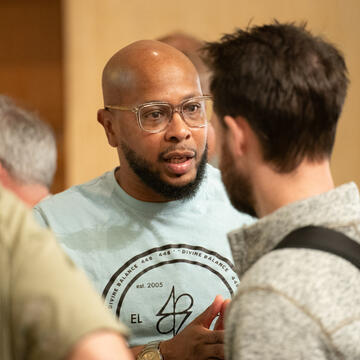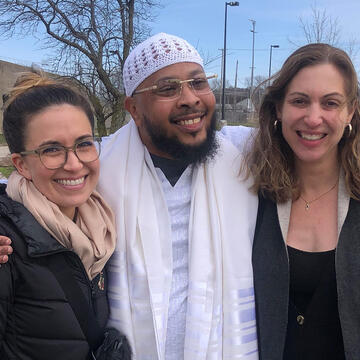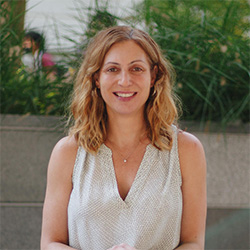
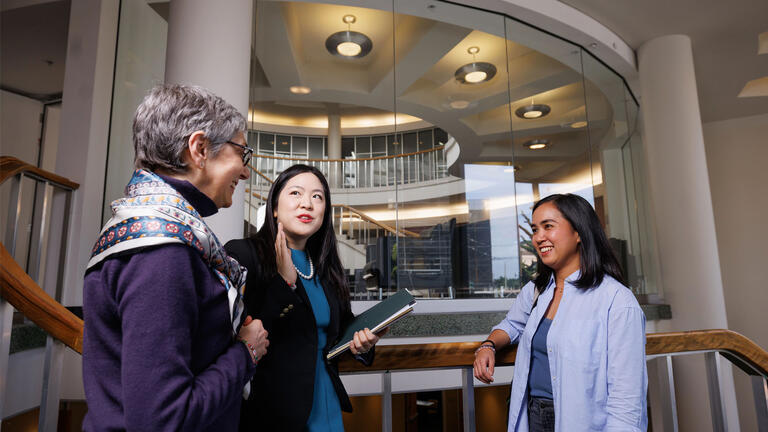
Racial Justice Clinic
In the USF Racial Justice Clinic, you’ll put your legal education into action, advocating for clients, investigating injustice, and helping to shape a more fair and equitable criminal legal system. This is hands-on, high-impact work, representing those without the means to defend themselves.
Our Projects
-
The Racial Justice Clinic litigates wrongful conviction cases throughout the United States. This work has resulted in the exonerations of Yutico Briley in Louisiana in 2021 and Leon Benson in Indiana in 2023, both were innocent men convicted based on cross-racial eyewitness misidentifications and either police misconduct or poor defense lawyering. Under the close supervision of the Clinic's professors, law students play a crucial role at every stage of reinvestigating a wrongful conviction case, whether it is knocking on doors to talk to witnesses, meeting with the clients, visiting crime scenes, reviewing the record, researching the law, helping to draft legal pleadings, or appearing in court. The Clinic's wrongful conviction work has received local, state, and national attention and is the subject of Season 3 of the hit podcast Suspect: Five Shots in the Dark.
Students may also have the opportunity to assist the Innocence Commission, which investigates colorable claims of innocence on behalf of the San Francisco DA's Office. Chaired by Professor Lara Bazelon, the Commission's first case was that of Joaquin Ciria, who was convicted of first-degree murder in 1991. After an exhaustive reinvestigation, the Commission concluded that Ciria was factually innocent and the DA agreed. In April 2022, the Racial Justice Clinic celebrated Ciria's exoneration and freedom after a judge overturned his conviction. Ciria's was the first collaborative exoneration in San Francisco history.
-
The Racial Justice Clinic works to free those who have been excessively punished through parole, commutation, medical reprieve, or resentencing. The Clinic has successfully represented incarcerated individuals at parole hearings since 2018, and prioritizes cases in which clients were teenagers or young adults at the time of the offense, or are now elderly, or who suffered from extreme abuse. This includes the recent release of an 88-year-old client, Pat Dunn, who was wrongfully convicted of killing his wife more than three decades ago. Following extensive advocacy by clinic students and their supervising professor, the Governor's office granted a medical reprieve; the students then assisted their USF professor in convincing the Parole Board to find the client suitable for release. California law also provides pathways for the resentencing of those serving extreme prison terms and no longer pose a danger if a judge, or a prosecutor, or the Department of Corrections initiates such a proceeding. Students meet with clients, review their prison and court records, and help Clinic professors with the legal pleadings and court appearances. The Clinic has assisted in the release of more than 100 individuals since 2020.
-
The Racial Justice Clinic is proud to partner with the Ella Baker Center for Human Rights and Silicon Valley De-Bug as recipients of a seven-figure, multi-year gift from the Crankstart Foundation to implement the California Racial Justice Act (RJA). This landmark law prohibits California prosecutors from obtaining a criminal conviction or a sentence based upon race, ethnicity, or national origin and the RJC is the clearinghouse for all requests for assistance that come from incarcerated individuals and their families. Under the supervision of their professors, students help to review these claims and provide referrals, litigate select cases, support implementation projects, and collaborate with defense attorneys throughout the state by providing research or investigation assistance.
-
The RJC is the only law clinic in the country that consistently litigates Title IX school discipline cases. The Clinic represents both complainants and respondents at colleges and universities across the country. We make sure that the clients-who are young and often in extreme distress-receive due process, and that the harm is addressed without the need for suspension or expulsion. In the past, the Clinic has been successful in routing some of these cases out of the traditional adversarial process and into a restorative justice process. Law students perform critical roles in these cases, including maintaining a supportive relationship with the client, reviewing the allegations and the record, investigating, and helping to prepare the client for a hearing or a restorative justice process.
After 25 Years in Prison, Justice
Exoneree Leon Benson, a Racial Justice Clinic client, speaks at USF.
Faculty

Professor Lara Bazelon
Lara Bazelon is a professor of law and the director of the Racial Justice Clinical Program at the University of San Francisco School of Law. She also holds the Barnett Chair in Trial Advocacy. From 2012-2015, she was a visiting associate clinical professor at Loyola Law School and the director of the Loyola Law School Project for the Innocent. Professor Bazelon was a trial attorney in the Office of the Federal Public Defender in Los Angeles for seven years. Prior to that, she was a law clerk for the Honorable Harry Pregerson on the United States Court of Appeals for the Ninth Circuit.
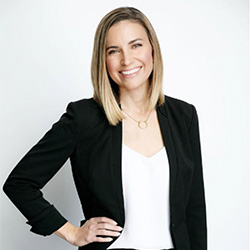
Professor Charlie Nelson Keever
Charlie Nelson Keever graduated from Loyola Law School in 2018 with a concentration in Public Interest Law. During law school, Charlie worked as a judicial extern to the Honorable Audrey B. Collins of the California Court of Appeal, Second Appellate District, and served as editor-in-chief of the Loyola of Los Angeles International and Comparative Law Review. As a clinical law student and research assistant for Loyola Law School's Project for the Innocent, Charlie worked to secure the release of four wrongfully convicted clients. Prior to joining USF's Racial Justice Clinic, Charlie practiced civil litigation at the Los Angeles and San Francisco offices of a national law firm. She is a proud Teach for America 2012 New York Corps alumna.
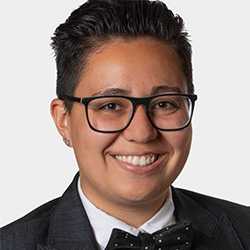
Professor Gabby King
Gabby King (formerly Gabby Sergi) is an Assistant Professor and Supervising Attorney with the University of San Francisco School of Law Racial Justice Clinic. Gabby’s work focuses on the California Racial Justice Act, resentencing, parole, Title IX, and restorative justice. She also teaches two undergraduate sociology courses: Justice Internship and Law School 101.
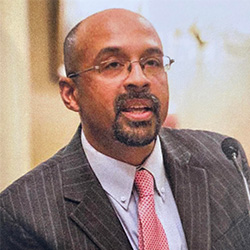
Professor Jacque Wilson
For the past 15 years, Jacque Wilson has worked with or mentored USF law students in the Criminal and Racial Justice Clinics. A senior trial lawyer at the San Francisco Public Defender’s Office, he serves as the head of the misdemeanor unit. He trains new attorneys, runs the intern program, and handles post-conviction cases.
As a trial attorney, Jacque helped reform California’s felony murder rule though the passage of SB 1437. SB 1437 significantly narrowed the felony murder rule and has helped many unjustly sentenced individuals gain their freedom. He also mentors hundreds of high school, college and law students through the San Francisco Public Defender’s Court Watch program, and is co-founder of Advocates For Justice, a non-profit organization that fights for social, economic and criminal justice.
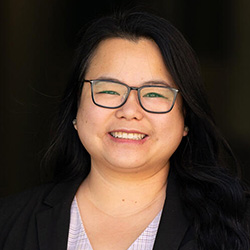
Professor Belle Yan
Belle Yan (she/her) is an Assistant Professor and Supervising Attorney with the Racial Justice Clinic. Previously, she was a deputy public defender in Contra Costa and Santa Clara counties. During law school, Belle externed for the Honorable Therese M. Stewart of the California Court of Appeal, First Appellate District, and interned at public defender’s offices in the Bay Area and the Public Defender Service in Washington D.C. She also served as the co-president of UC Law SF Haiti Justice Partnership (then Hastings-to-Haiti Partnership) and as a board member of Asian Pacific American Law Student Association.
A Gift of $1 Million to USF School of Law’s Racial Justice Clinic
The University of San Francisco School of Law was awarded a one million dollar gift from the Crankstart Foundation to support the Racial Justice Clinic which will expand its efforts to enforce the California Racial Justice Act.
